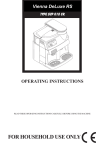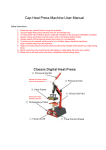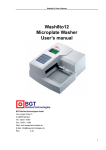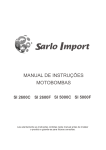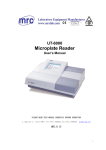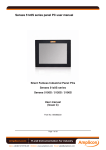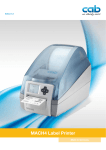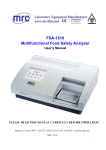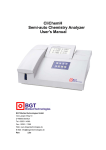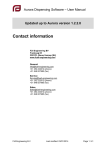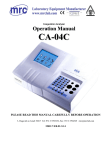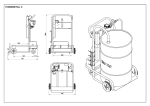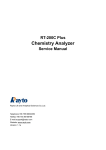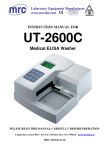Download This Manual gives you the information needed to :
Transcript
RT-2600C User’s Manual RT-2600C Microplate Washer User’s Manual Copyright: Address: Website: Rev: Rayto Life and Analytical Sciences Co., Ltd. A/6F, Technology Building, Industrial Road, Shekou, Shenzhen, China www.rayto.com 3.5e RT-2600C User’s Manual CONTENTS SYMBOLS DESCRIPTION...................................................................................................... 1 SAFETY PRECAUTIONS AND POTENTIAL HAZARDS ................................................... 2 ADDITIONAL PRECAUTIONS................................................................................................ 3 1. GENERAL INFORMATION............................................................................................... 4 1.1. 1.2. 1.3. 1.4. How to use this manual ......................................................................................................... 4 Copyright.................................................................................................................................. 5 Property of ............................................................................................................................... 6 Warranty .................................................................................................................................. 7 2. USE AND FUNCTION ....................................................................................................... 8 2.1. 2.2. 2.3. 2.4. Name and intended use ........................................................................................................ 8 Product Features .................................................................................................................... 8 Specifications .......................................................................................................................... 9 System Description .............................................................................................................. 10 2.4.1. Hardware Components....................................................................................................................... 10 3. INSTALLATION................................................................................................................. 12 3.1. 3.2. 3.3. 3.4. 3.5. Unpacking.............................................................................................................................. 12 Installing the Wash Bottle.................................................................................................... 12 Installing the Waste Bottle................................................................................................... 13 Installing the dispensing head ............................................................................................ 13 Turn on the system............................................................................................................... 13 4. OPERATION ..................................................................................................................... 14 4.1. 4.2. Function description ............................................................................................................. 14 4.1.1. Keyboard .............................................................................................................................................. 14 4.1.2. Dispense............................................................................................................................................... 15 4.1.3. Aspiration.............................................................................................................................................. 16 4.1.4. Start the programmer.......................................................................................................................... 17 System settings..................................................................................................................... 19 4.2.1. Adjusting Contrast ............................................................................................................................... 19 4.2.2. Changing Wash-Head ........................................................................................................................ 19 4.2.3. Changing Plate .................................................................................................................................... 20 4.2.4. Adjusting Wash-Head ......................................................................................................................... 20 4.2.5. Adjust the horizontal of the wash-head ............................................................................................ 21 4.2.6. Adjusting Top Aspiration .................................................................................................................... 21 4.2.7. Adjusting Pump.................................................................................................................................... 22 5. MAINTENANCE AND CLEANING................................................................................. 23 5.1. 5.2. 5.3. 5.4. Daily maintenance of worktable ......................................................................................... 23 Maintenance of dispensing head ....................................................................................... 23 Waste bottle treatment......................................................................................................... 24 Maintenance of the wash bottle.......................................................................................... 24 6. TROUBLESHOOTING .................................................................................................... 25 RT-2600C User’s Manual SYMBOLS DESCRIPTION Symbols in the manual NOTE! Notes contain additional information or tips when using the instrument. ATTENTION! Cautions Cautions should be followed carefully to ensure your instrument work correctly and to avoid unnecessary personal injury. Symbols on the instrument This means that the labeled item could lead to personal injury and/or damage to the analyzer. The symbol is labeled beside the power outlet and some external interface. The symbols for “SERIAL NUMBER”, the serial number shall be after or below the symbol, adjacent to it The symbol means the product is in vitro diagnostic medical device. 1 RT-2600C User’s Manual SAFETY PRECAUTIONS AND POTENTIAL HAZARDS General Before you start installing and working with the washer, you should read the safety precautions and regulations shown in this chapter. Operator Qualification Please note that the operation with Microplate Washer should be carried out only by the doctor or clinical inspectors who have undergone necessary training provided by the sales agent. Service Technician Qualification To install, maintain and repair the instrument, a service technician has to be trained on the instrument by the manufacturer or their representative. A service technician is also expected to be familiar with the normal operation of the instrument as described in the User’s manual and the special operations as described in the service manual. Electrical To use washer safely, pay attention to the following items: To prevent the risk of electrical shock and/or damage to the instrument Operator should not open the cover of the instrument. Only authorized personnel, for example, service technicians, may open the instrument to perform maintenance or repair. Touching the main board when the power is on may cause severe injury or death. Any problem, please ask for helps from your supplier. Mechanical There is no risk presented by the mechanical parts of the instrument when the instrument is closed. If the covers of the instruments are removed, mechanical parts could cause personal injury or the instrument may be damaged if the following advice is not being considered: DO NOT wear loose garments or jewellery that could catch in mechanisms. DO NOT put your fingers/hands into the pathway or any part while the instrument is in operation. DO NOT attempt mechanical repair unless the instrument is not in operation or OFF. Waste bottle There is infectious risk of to touch the waste bottle when the instrument is washing Microplate. User must be equipped with glove to touch waste bottle at time of disposing of waste liquid. Pay attention to guard against the bottle waste liquid leakage. Chemical The operator is responsible for taking all necessary precautions against hazards associated with the use of clinical laboratory chemicals. Wipe up any reagent spillage on the instrument immediately. Biohazardous Materials As sample container, Microplate should be treated as the potentially biohasardous. All materials and mechanical components associated with the sampling and waste system should be handled 2 RT-2600C User’s Manual according to your facility’s biohazard procedure. Use the personal protective equipment recommended by your facility when handling any of these components. Detailed recommendations: - Waste solutions and solid wastes Avoid direct contact with waste solution and/or solid waste. Both should be handled as potentially biohazardous. Dispose of waste solution and/or solid waste according to the relevant governmental regulations. ADDITIONAL PRECAUTIONS - Flammables Avoid using dangerous flammable material around the instrument. - Accuracy/Precision of the Measured Results For proper use of the instrument, measure control samples and monitor the instrument during the operation. - Operation and Maintenance During operation and maintenance of the instrument, proceed according to the instructors and do not touch any parts of the instrument other than those specified. Verify the front covers closed while the instrument in operation. Avoid touching the mechanism, such as the 2-axis motion platform inside the instrument, while the instrument is operating. This may cause serious personal injury or damage the instrument. 3 RT-2600C User’s Manual 1. GENERAL INFORMATION 1.1. How to use this manual This User’s Manual contains descriptions and instructions for the operation and general maintenance of the RT-2600C Microplate Washer. To ensure optimum performance of the instruments, these procedures should be followed as stated. This manual gives you all the information needed to: z z z z Install the RT-2600C Microplate Washer Understand the RT-2600C Set the RT-2600C system up to meet your exact needs Run wash protocols using the RT-2600C system 4 RT-2600C User’s Manual 1.2. Copyright Rayto Life and Analytical Sciences Co., Ltd. (R&D and Markiting Development Center) 2F,Building 5, Software Park,Kejizhong 2 Road, High-tech Industrial park, Nanshan, Shenzhen 518057,P.R.China. Rayto Life and Analytical Sciences Co., Ltd. (Hereinafter called RAYTO) owns all rights to this unpublished work and intends to maintain this work as confidential. RAYTO may also seek to maintain this work as an unpublished copyright. This publication is to be used solely for the purposes of reference, operation, maintenance, or repair of RAYTO equipment. No part of this can be disseminated for other purposes. In the event of inadvertent or deliberate publication, RAYTO intends to enforce its rights to this work under copyright laws as a published work. Those having access to this work may not copy, use, or disclose the information in this work unless expressly authorized by RAYTO to do so. All information contained in this publication is believed to be correct. RAYTO shall not be liable for errors contained herein nor for incidental or consequential damages in connection with the furnishing, performance, or use of this material. This publication may refer to information and protected by copyrights or patents and does not convey any license under the patent rights of RAYTO, nor the rights of others. RAYTO does not assume any liability arising out of any infringements of patents or other rights of third parties. Content of this manual is subject to changes without prior notice. 5 RT-2600C User’s Manual 1.3. Property of Rayto Life and Analytical Sciences Co., Ltd. (R&D and Markiting Development Center) 2F,Building 5, Software Park,Kejizhong 2 Road, High-tech Industrial park, Nanshan, Shenzhen 518057,P.R.China. Responsibility on the manufacturer party RAYTO is responsible for safety, reliability and performance of this equipment only in the condition that: z z z All installation, expansion, change, modification and repair of this equipment are conducted by RAYTO qualified personnel; Applied electrical appliance is in compliance with relevant National Standards; The instrument is operated under strict observance of this manual. Note! This equipment is not intended for family usage. This equipment must be operated by skilled/trained clinical personnel. Warning! It is important for the hospital or organization that employs this equipment to carry out a reasonable maintenance schedule. Neglect of this may result in machine breakdown or injury of human health. Upon request, RAYTO may provide, with compensation, necessary circuit diagrams, calibration illustration list and other information to help qualified technician to maintain and repair some parts, which RAYTO may define as user serviceable. 6 RT-2600C User’s Manual 1.4. Warranty Workmanship & Materials RAYTO guarantees new equipment other than accessories to be free from defects in workmanship and materials for a period of 14 months from date of shipment under normal use and service. RAYTO obligation under this warranty is limited to repairing, at RAYTO option, any part which upon RAYTO examination proves defective. THIS WARRANTY IS EXCLUSIVE AND IS IN LIEU OF ALL OTHER WARRANTIES, EXPRESSED OR IMPLIED, INCLUDING WARRANTIES OF MERCHANT ABILITY OR FITNESS FOR ANY PARTICULAR PURPOSE. Exemptions RAYTO obligation or liability under this warranty does not include any transportation or other charges or liability for direct, indirect or consequential damages or delay resulting from the improper use or application of the product or the substitution upon it of parts or accessories not approved by RAYTO or repaired by anyone other than a RAYTO authorized representative. This warranty shall not extend to any instrument which has been subjected to misuse, negligence or accident; any instrument from which RAYTO original serial number tag or product identification markings have been altered or removed, or any product of any other manufacturer. Safety, Reliability and Performance RAYTO is not responsible for the effects on safety, reliability and performance of the RT-2600C Microplate washer if: z Assembly operations, extensions, re-adjusts, modifications or repairs are carried out by persons other than those authorized by RAYTO. z Personnel unauthorized by RAYTO repairs or modify the instrument. 7 RT-2600C User’s Manual 2. USE AND FUNCTION 2.1. Name and intended use The RT-2600C Microplate Washer is a microprocessor controlled Microplate washing system that performs wash protocols defined by the user. The RT-2600C is designed to wash all of the wells in one column or row of a 96-well plate at once. The washing protocol can be programmed so that either all of the columns (or rows) are washed in the same manner or different wash cycles can be applied to specific columns (or rows) on the plate. 2.2. Product Features z English operating system with large display for easy operation. z Suitable for flat-bottom, U and V shaped micro plates or micro strips including 8x12, 12x8, 8x6 or 12x4 micro plates. z Large storage capacity (up to 50 different washing programs can be edited and stored). z Automatic check of vacuum pressure to avoid jamming of the tubing. z Automatic positioning, which enables to rinse different plates. Manual fine tuning ensures accurate positioning. z Liquor surface induction system with a liquor level alarm function and double-needle design to reduce cross contamination. z Easy programming. The number of rinse, the amount of liquor and the soaking time can be set according to user’s needs. Plate washing, line washing and skipping rinse are at your option. z Rinse pressure and the amount of liquor are adjustable to reduce air bubbles and to ensure thorough rinse. Automatic successive rinses and 8-path or 12-path rinse heads are interchangeable. 8 RT-2600C User’s Manual 2.3. Specifications Operation Wash head Display Net weight Storage Bottle Capacity Liquor Contact Medium Dimensions (W x D x H) Power Supply 8-channel or 12-channel 5’’ LCD 8.5 KG 2000 ml (both, washing liquor and waste bottle) glass, nylon, poly tetrafluorine ethylene, polypropylene, stainless steel, Tygon® tubing 390mm(L)×330mm(W)×177mm(H) AC220V±10%, 50/60Hz, 110V on request Power Consumption Fuse 80 VA 5A/250V,Ф5×20 Environmental requirements Operating Range Transport and storage environments Computer Interface Interface Baud rate Parity Stop bit 10℃∼30℃, relative humidity ≤70% -20℃~50℃, relative humidity ≤93% Serial RS-232 port 19200 Odd 1 9 RT-2600C User’s Manual 2.4. System Description 2.4.1. Hardware Components The hardware components of the RT-2600C Microplate Washer are shown in figure 1. Figure 1.The RT-2600C system Wash Head The wash head contains a set (1x8 or 1x12) of dual wash pins. Each set of wash pins includes a dispense pin and an aspirate pin. They are closely spaced so that the fluid can be aspirated from a well while fluid is dispensed into the same well. The wash head moves back and forth to wash each column (or row, depending on the wash head used) of the plate by lowering the wash pins into the corresponding wells. Display Panel The instrument communicates with the user via the display. All system information and wash parameters entered by the user are displayed. Keypad The keypad is used by the operator to select commands and to enter the wash parameters. RS-232 Interface The instrument includes an RS-232 interface so that an external computer can be connected for technical service purposes in the future. The RS-232 interfaced may also be used for updating new software versions. 10 RT-2600C User’s Manual Wash Bottle The wash bottle contains the wash fluid for dispensing, filling and purging with a dispense pump inside. Waste Bottle The waste bottle (with level sensor inside) collects the fluid aspirated from the wells. Attention! Cautions There is infectious risk of to touch the waste bottle when the instrument is washing Microplate! User must be equipped with glove to touch waste bottle at the time of disposing of waste liquid. Pay attention to guard against the bottle waste liquid leakage Connections Connectors at the rear of the RT2600C system are shown in Figure 2. Connections for the power cord, the dispense pump power connector, the waste bottle level sensor, the waste bottle vacuum line and the external computer are shown at the rear of the panel. Figure 2.Rear View of the RT-2600C system 11 RT-2600C User’s Manual 3. INSTALLATION 3.1. Unpacking z z z z z Carefully unpack the instrument and remove it from the plastic bag. Report any visible damage to your shipper or freight carrier at once. Place RT-2600C on a flat working surface. Place the wash bottle and waste bottle behind RT-2600C Remove the power cable and other items from the packing carton. Please retain the packing material for future use. 3.2. Installing the Wash Bottle z Connect the dispensing tube with pump. Figure 3. Pump z Let the pump power cable and the dispense tube go through the hole on the wash bottle cover. Thereafter put the pump into the wash bottle. Figure 4. Wash bottle with pump z Fill the wash bottle with the wash solution. z Place the wash bottle behind the instrument. 12 RT-2600C User’s Manual z Connect the wash tube to the wash bottle tube connector at the rear panel of the instrument (see figure 2). z Connect the dispense pump power cable to corresponding connector at the rear panel of the instrument (see figure 2). 3.3. Installing the Waste Bottle z Place the waste bottle behind the instrument z Connect the waste tubes to the waste bottle tube connectors at the rear panel of the instrument (see figure 2). z Connect the level sensor cable to corresponding connector at the rear panel of the instrument (see figure 2). 3.4. Installing the dispensing head z Twist one end of the dispensing tube (white connector) and the discharge tube (transparent connector) onto the tubular joints on the worktable according to their colors. z Twist the two tubes onto the same colored tubular joints of the dispensing head. z Put the dispensing head from above onto the supporting arm. Make sure, that both ends of the steel pin of the dispensing head are placed stably in the fillister of the supporting arm. z If necessary, adjust the dispensing head parallel to the worktable with the two adjusting screws at the root of the supporting arm. 3.5. Turn on the system z Fill up the wash bottle with washing liquid. z Take the power cord out of its bag. Connect one end to the RT-2600C and the other to a main power socket. z Press the power switch on the rear side of the instrument. z After a series of self tests, the software version interface will display. Attention! Cautions Safety is most important! Please note the safety precautions and potential hazards mentioned above chapter, Before operate the instrument. You should also consider the common safety regulations of your laboratory. Check the instrument’s connection; Make sure that the power cord is connected to the power supply and to the instrument. Handle the waste correctly; Make sure that the waste tubing on the instrument is connected to the waste bottle. Avoiding contaminating yourself, your environment and the instrument with biohazardous material. 13 RT-2600C User’s Manual 4. OPERATION 4.1. Function description 4.1.1. Keyboard The keyboard is mainly used for the input of all instructions and to convert the display signals. Figure 5 shows the keyboard layout. Function of each button PRIME Start Prime procedure RINSE Start Rinse procedure DISP Start Dispensing procedure ASPR Start Aspiration procedure SELECT START CANCEL Figure 5.RT-2600C Keyboard Change edit item Start wash procedure; Go to next operation Cancel current operation;; Double click to enter system setting + Change parameter - Change parameter Prime By pressing the PRIME key the filling process is initiated. Rinse By pressing the RINSE key the rinse procedure is initiated. 14 RT-2600C User’s Manual 4.1.2. Dispense By pressing the DISP key the dispensing procedure is initiated. The display panel is like follows: Dispensing Fluid Volume 350μL By pressing the “+” or the “-“key you can change the dispense volume by a 50 μL step. After the fluid volume is defined press the START key. The display shows the following information: Strip Setting 8 Pressing the “+” or the “-“key defines the number of rows (e.g. 1 to 12) to be dispensed. By choosing “Strip Select” and pressing the START key you can define by pressing the “+” or the “-“key which of the rows of the plate should be dispensed. Strip Setting Strip Select By pressing the SELECT key the desired row is marked. 15 RT-2600C User’s Manual 4.1.3. Aspiration By pressing the ASPR key the aspiration procedure is initiated. The display panel is as follows: Aspiration Aspiration Single By pressing the “+” or the “-“key you can choose between single or double aspiration. Press START and the following display appear: Strip Setting 8 Pressing the “+” or the “-“key defines the number of rows (e.g. 1 to 12) to be aspirated. By choosing “Strip Select” and pressing the START key you can define by pressing the “+” or the “-“ key which of the rows of the plate should be aspirated. Strip Setting Strip Select By pressing the SELECT key the desired row is marked. 16 RT-2600C User’s Manual 4.1.4. Start the programmer The programmer is started by double clicking the START key. The display shows as follows: No. 1 Wash Mode Wash Times Aspiration Fluid Volume Soak Time Plate 1 Single 350μL 00h00m00s By pressing the SELECT key you can choose the parameter that needs to be changed according to your proposed washing procedure. Wash Mode z Plate z Strip whole plate row by row Wash Times z From 1 to 12 times Aspiration z Single or double Fluid Volume z To be changed in steps of 50 μL by pressing the “+” or the “-“ key z Range: 50 μL – 3000 μL Note! Select the fluid volume according to the volume of your Microplate wells to avoid excessive consumption of liquid. Soak Time z By using the SELECT and the “+” or the “-“keys the desired soak time is set. 17 RT-2600C User’s Manual Press “START” Key and the following display appears: Strip Setting 8 Press “START” to start wash procedure. Press”+ “to enter the strip designating window, press “+”to select the designating strip then press select to confirm of exit. When the cuvette following is empty, it mean that the instrument will not dispense this strip. No .1 1/1 Press “START” once again to start wash procedure. Your can double press “CANCEL” to abort during washing procedure. 18 RT-2600C User’s Manual 4.2. System settings By double clicking the CANCEL key the “System Setting” mode is entered and the display is as follows: Adjusting Contrast Changing Wash-Head Changing Plate Adjusting Wash-Head Adjusting Top-Aspr Adjusting Pump By pressing the SELECT key you can change between the setting items. By pressing the START key you enter the according submenu of the selected item. 4.2.1. Adjusting Contrast Contrast By pressing the “+” or the “-“key the contrast of the display is changed according to the user’s needs. Press the START key to save the changing or the CANCEL key to ignore them. 4.2.2. Changing Wash-Head Changing Wash-Head 12 Pins 19 RT-2600C User’s Manual By pressing the “+” or the “-“key you can change between 8 or 12 pin wash-head. Press the START key to save the changing or the CANCEL key to ignore them. 4.2.3. Changing Plate Changing Plate Flat Bottom By pressing the “+” or the “-“key you can select either wells with flat bottom, V-bottom or Round (U)-bottom. Press the START key to save the changing or the CANCEL key to ignore them. 4.2.4. Adjusting Wash-Head Due to the fact that the dimensions of the microplates on the market are not uniform, the RT-2600C provides the function of dispensing head position adjustment. Users can adjust the position of the dispensing head within the range of ± 1mm in both, vertical and horizontal direction, so as to adapt the to microplates of different specifications. In the horizontal direction the liquid suction needle (the thick, long needle) is required to be put at the center of the Microplate well. In vertical direction, the liquid suction needle is required to fall completely onto the bottom of the Microplate well. A clearance of 0.5 to 1mm is recommended between the steel pin of the dispensing head and the fillister of the supporting arm groove. Adjusting Wash-Head Horizontal +0.1mm Vertical –0.1mm 20 RT-2600C User’s Manual By pressing the SELECT key you can change between horizontal and vertical adjustment of the wash-head. By pressing the “+” or the “-“key the adjustment value is increased or decreased in steps of 0.1mm. Press the START key to save the changing or the CANCEL key to ignore them. 4.2.5. Adjust the horizontal of the wash-head Adjust these keys to make the wash-head horizontal Figure 6.Adjust the wash-head 4.2.6. Adjusting Top Aspiration When the amount of dispensation is higher than the capacity of the Microplate wells, the system will automatically initiate the top aspiration. If the top aspiration doesn’t function properly, the position of top aspiration should be adjusted Adjusting Top-Aspr 0.0mm By pressing the “+” or the “-“key the adjustment value is increased or decreased in steps of 0.1mm. Usually the position of the liquid suction needle is adjusted to the position that is aligned with the top of the Microplate well. Press the START key to save the changing or the CANCEL key to ignore them. 21 RT-2600C User’s Manual Please watch the position of the wash-head while you are adjusting the Top-Aspiration position. Make sure that the wash-head has been adjusted to a little above the cuvette, as shown in Figure 7. Figure 7.Adjust Top-Aspiration position 4.2.7. Adjusting Pump The fine tuning of the diving pump’s voltage can slightly adjust the speed of washing liquid injection. The value 0000 is recommended Adjusting Pump 0000 By pressing the “+” or the “-“key the adjustment value is increased or decreased in steps of 1. The adjustment range is between 0 and 10. Press the START key to save the changing or the CANCEL key to ignore them. 22 RT-2600C User’s Manual 5. MAINTENANCE AND CLEANING 5.1. Daily maintenance of worktable There is often remnant liquid on the worktable, and excessive liquid may spill over the edge of the worktable and seep into the instrument. Therefore, it is necessary to wipe off remnant liquid on the worktable from time to time. Use tweezers to nip a small piece of absorbent cotton to wipe the worktable. Use caution that the head of the tweezers don’t scratch the surface of the worktable. 5.2. Maintenance of dispensing head The dispensing head is one of the core components of the RT-2600C, whose condition has an influence on the accuracy of the amount of dispensation as well as the amount of remnant liquid. Therefore, the maintenance of the dispensing head is of high significance. The maintenance procedure is as follows: z z z z z z z Switch off the electric source of the machine. Remove the tubes by twisting counterclockwise. Put the dispensing head from the supporting arm. Remove the two metal screws on the front side of the dispensing head. Use the small-sized needle to clear out each dispensing needle (short, thin needle) and use the large-sized needle to clear out each liquor suction needle (long, thick needle). Take the dispensing head with the screw-removed end downward. Knock it against a paper towel or gauze so as to remove the blocking from the tubing. Put the O-ring around the root of the metal screws and tighten the two screws up Note! the O-rings must be put around the screws so as to guarantee hermeticity. z z Fill up a large container with distilled water and immerse the dispensing head completely in the water. Plug a large-size syringe into the plastic hole on the dispensing head and push the syringe back and forth for several times. Both plastic holes will be treated this way. Mount the dispending head back onto the supporting arm and tighten up the plastic tubes clockwise Note! assure that the tubes are connected according to their color code. 23 RT-2600C User’s Manual 5.3. Waste bottle treatment The sensors in the waste bottle can sense the liquid height. If the waste liquid reaches a certain height, the software of the RT-2600C detects the change of the sensor signal and stops any operation that involves liquid suction. At this time, please dispose the waste liquid timely, which can be done without disconnecting the electrical source. z Hold the top of the waste bottle with one hand and lift it slightly. z Hold the body of the waste bottle with the other hand and turn clockwise until the top is detached from the bottle body. z Pour away the waste liquid. z Put the tube endings and the sensor back into the waste bottle and close it by turning the bottle counterclockwise. 5.4. Maintenance of the wash bottle Fill up the wash bottle with distilled water to wash the blank plate once a week and clean up the whole pore path and the diving pump. Note! The water level in the wash bottle should be higher than the diving pump inside to avoid the aspiration of air. 24 RT-2600C User’s Manual 6. TROUBLESHOOTING List of malfunctions Problem Solution When switching on the instrument no display appears and the instrument does not start up. The instrument does not suck up the liquid and the vacuum pump does not work. The instrument does not dispense liquid. Check the electric supply socket and fuse. Check the power supply to the control board for 5V, 12V and 24V input. Check the power supply for 24V output. The liquid is out of control and dispensed all the time. Check the dispensing head for clogs and the electromagnetic valve for malfunction. Check the electromagnetic valve for malfunctions. If the problems cannot be solved please contact your dealer or distributor for further assistance. 25



























